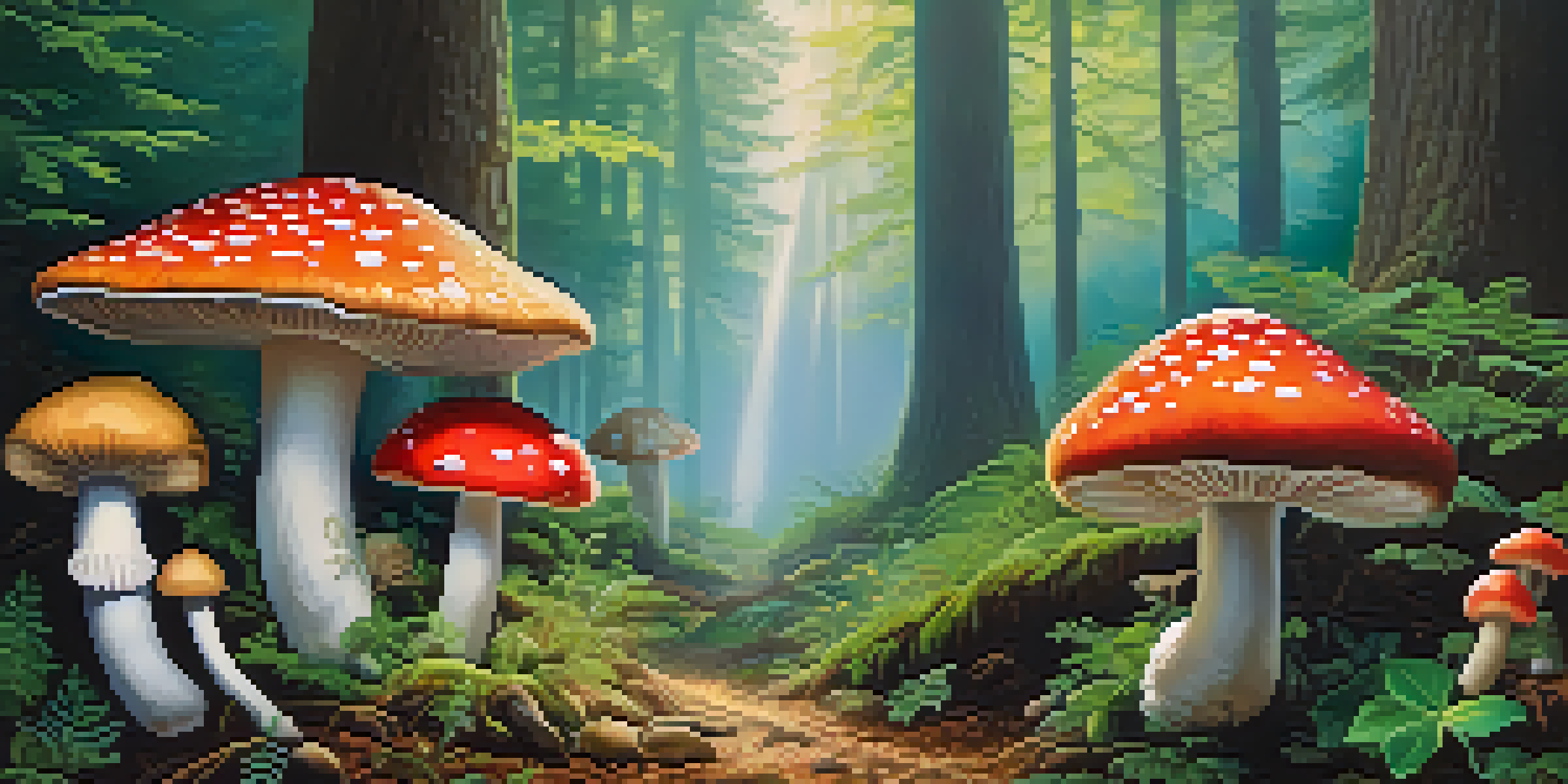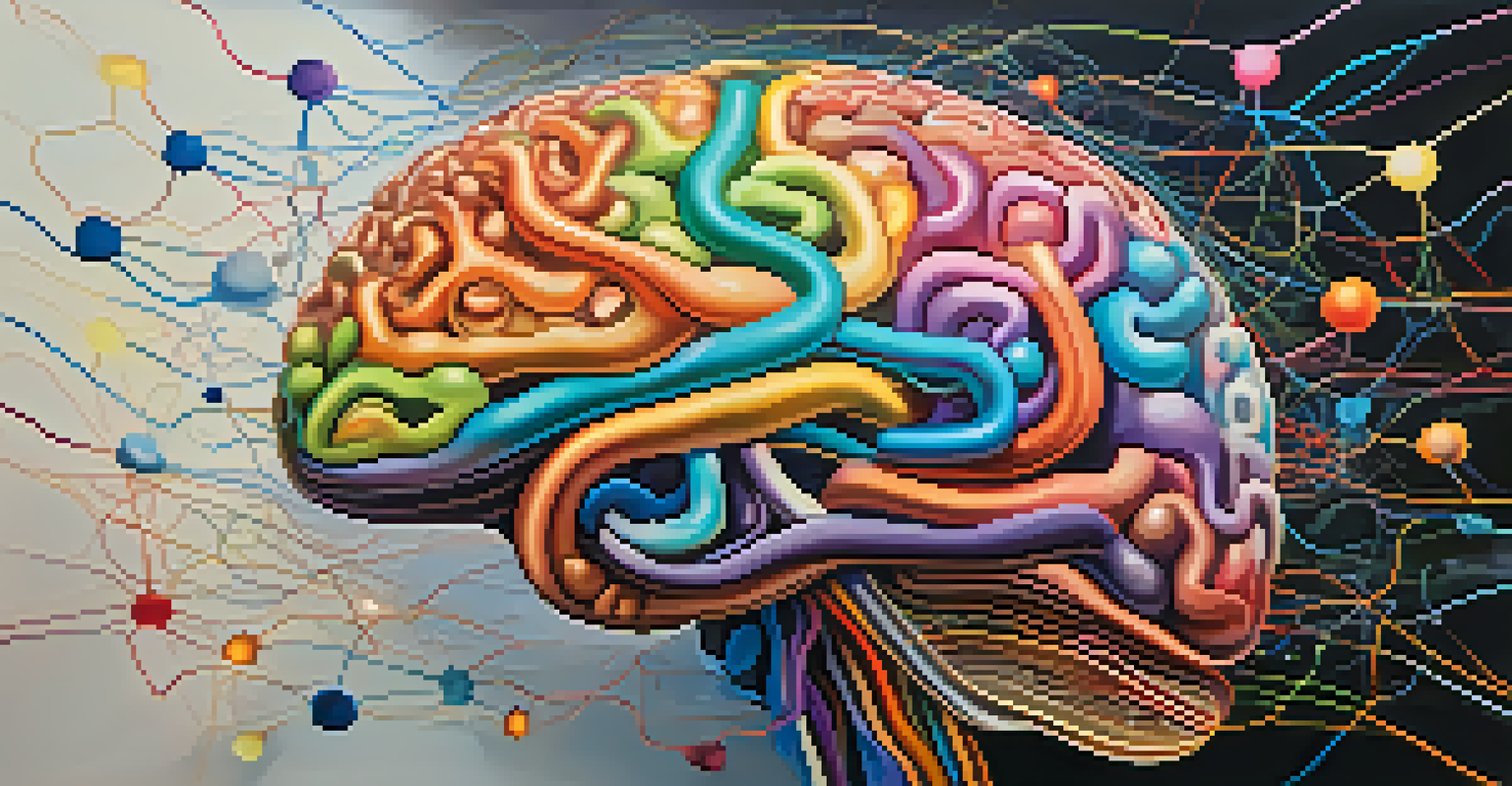The Role of Psilocybin in Treating Depression: Current Research

Understanding Psilocybin and Its Origins
Psilocybin is a naturally occurring psychedelic compound found in certain mushrooms, often referred to as magic mushrooms. For centuries, various cultures have used these mushrooms in spiritual and healing practices. The compound works in the brain by converting into psilocin, which affects serotonin receptors, potentially altering mood and perception.
Psychedelics may be the most promising tool we have to treat mental illness in a generation.
Recent interest in psilocybin has surged as researchers explore its therapeutic potential, especially in treating mental health disorders like depression. Unlike traditional antidepressants, which can take weeks to show effects, psilocybin may induce significant changes after just one or two sessions. This rapid response offers hope for those struggling with chronic depression.
The revival of research into psilocybin's effects on mental health has sparked a broader conversation about psychedelics in medicine. While the substance has often been stigmatized, growing evidence suggests that it may play a crucial role in modern psychiatric care, particularly for treatment-resistant depression.
Current Research Landscape on Psilocybin
Several clinical trials over the past few years have investigated psilocybin's effects on depression, revealing promising results. For instance, a landmark study from Johns Hopkins University found that a single dose of psilocybin significantly reduced symptoms of depression in participants. These findings have paved the way for further research into structured treatment programs involving psilocybin.

In addition to Johns Hopkins, institutions like New York University and Imperial College London are also conducting studies exploring the effects of psilocybin therapy. Their research focuses on how guided sessions can help patients process emotions and gain new perspectives on their struggles. This therapeutic approach may foster lasting change, offering hope for those who have exhausted conventional treatment options.
Psilocybin's Rapid Effects on Depression
Research shows psilocybin can significantly improve mood and emotional well-being within hours, offering a promising alternative to traditional antidepressants.
The current landscape indicates a shift in the perception of psychedelics, with many researchers advocating for their inclusion in mental health treatment protocols. As studies continue, the evidence is mounting that psilocybin could be a game-changer in addressing the mental health crisis affecting millions worldwide.
Mechanisms Behind Psilocybin's Effects
Understanding how psilocybin works in the brain is crucial to appreciating its potential therapeutic effects. When ingested, psilocybin transforms into psilocin, which interacts with serotonin receptors, particularly the 5-HT2A receptor. This interaction can enhance neural connectivity, allowing different parts of the brain to communicate more effectively.
The potential for psilocybin to help people reconnect with their true selves is what excites me most about this research.
One of the most fascinating aspects of psilocybin is its ability to promote neuroplasticity, the brain's capacity to reorganize and form new connections. This can be particularly beneficial for individuals suffering from depression, as it may help them break free from negative thought patterns. By encouraging a fresh perspective, psilocybin can lead to profound insights during therapy sessions.
Moreover, the mystical experiences reported by many participants during psilocybin sessions often lead to a sense of interconnectedness and emotional release. These experiences can foster a deeper understanding of one's own mental health struggles, allowing for greater emotional healing and personal growth.
Psilocybin vs. Traditional Antidepressants
When comparing psilocybin to traditional antidepressants, several key differences emerge. Traditional medications, such as SSRIs, often take weeks to months to show results and can come with a variety of side effects. In contrast, psilocybin therapy can produce significant improvements in mood and emotional well-being within hours or days.
Additionally, while traditional treatments may require ongoing daily use, psilocybin therapy can be administered in fewer sessions, making it a more appealing option for some patients. This potential for rapid relief is particularly vital for those experiencing severe depressive episodes or suicidal thoughts.
Growing Acceptance of Psychedelics
As studies on psilocybin's therapeutic potential advance, there is a noticeable shift in the perception of psychedelics in mental health treatment.
However, it's essential to note that psilocybin isn't a one-size-fits-all solution. The therapeutic process involves careful screening, preparation, and integration support to ensure the best outcomes. This comprehensive approach highlights the need for experienced professionals to guide patients through their psilocybin journey.
Potential Risks and Considerations
While psilocybin holds promise for treating depression, it's not without its risks and considerations. Some individuals may experience challenging psychological effects, such as anxiety or paranoia, during their sessions. These reactions can be particularly intense for those with a history of mental health issues or unresolved trauma.
It's crucial for patients to undergo thorough screening before participating in psilocybin therapy. Mental health professionals should assess each individual's suitability for treatment, considering factors like personal history and current mental state. This careful vetting process can help minimize potential risks and ensure a safe therapeutic environment.
Moreover, the legal status of psilocybin remains a hurdle in many regions. As research continues to advance, advocates are pushing for regulatory changes to allow for wider accessibility. Understanding the evolving landscape of psilocybin legality is vital for both practitioners and patients interested in this treatment option.
The Future of Psilocybin Research
The future of psilocybin research looks bright, with an increasing number of studies exploring its potential applications beyond depression. Researchers are investigating its efficacy in treating anxiety, PTSD, and addiction, aiming to uncover its full therapeutic potential. This expanding focus could revolutionize mental health treatment as we know it.
Additionally, as more positive results emerge from current trials, there is a growing push for policy reform and the decriminalization of psilocybin. Advocates argue that making psilocybin more accessible could provide relief to countless individuals struggling with mental health issues. This shift could lead to a more holistic approach to mental health care.
Risks and Considerations in Therapy
While psilocybin therapy holds promise, careful screening and professional guidance are essential to minimize potential psychological risks.
Finally, the integration of psilocybin therapy into mainstream mental health practices is on the horizon. As therapists gain training in psychedelic-assisted therapy, we may see a more comprehensive understanding of mental wellness that includes these innovative treatments. The future of psilocybin research holds exciting possibilities for improving lives worldwide.
Conclusion: Embracing the Potential of Psilocybin
In conclusion, psilocybin presents a fascinating potential for treating depression, especially for those who have not found relief through traditional methods. Current research supports its efficacy, highlighting the need for continued exploration and understanding of its benefits. As we embrace this new era of mental health treatment, it’s essential to approach psilocybin therapy with an open mind and a commitment to safety.
The integration of psilocybin into therapeutic practices could mark a significant shift in how we address mental health issues. With ongoing studies and a growing body of evidence, the future looks promising for this natural compound. By fostering a supportive environment and emphasizing patient-centered care, we can ensure that psilocybin therapy is used responsibly and effectively.

Ultimately, the journey toward understanding psilocybin's role in mental health care is just beginning. As research progresses, we may uncover new insights that could change the landscape of depression treatment forever, offering hope to millions in need.